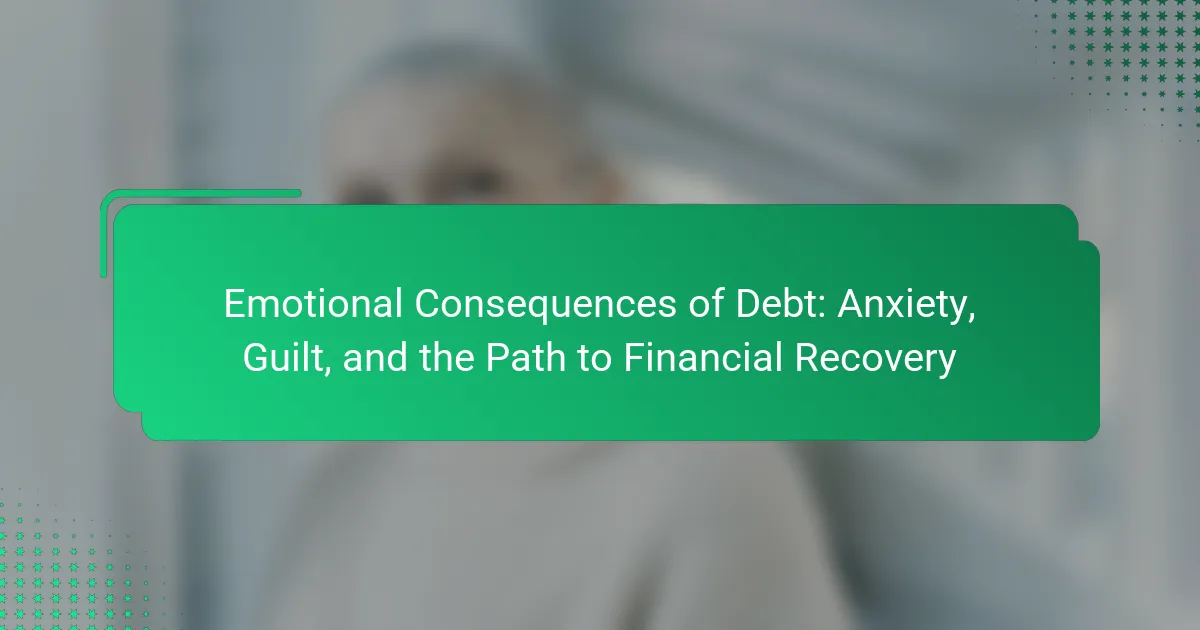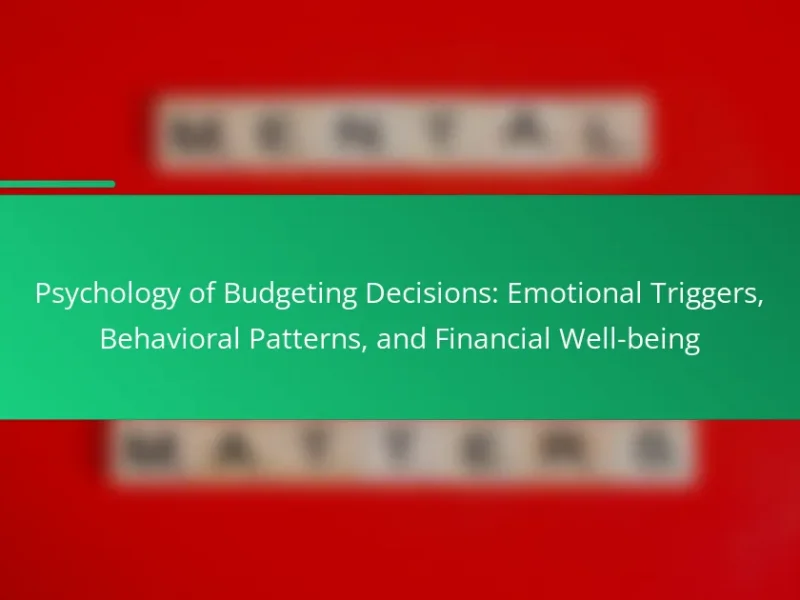Debt can lead to significant emotional consequences, including anxiety and guilt. These feelings can hinder financial recovery and overall well-being. Addressing anxiety from financial stress, guilt from perceived failures, and seeking support are crucial steps for regaining control. Understanding these emotional impacts is essential for effective financial recovery and improving mental health.
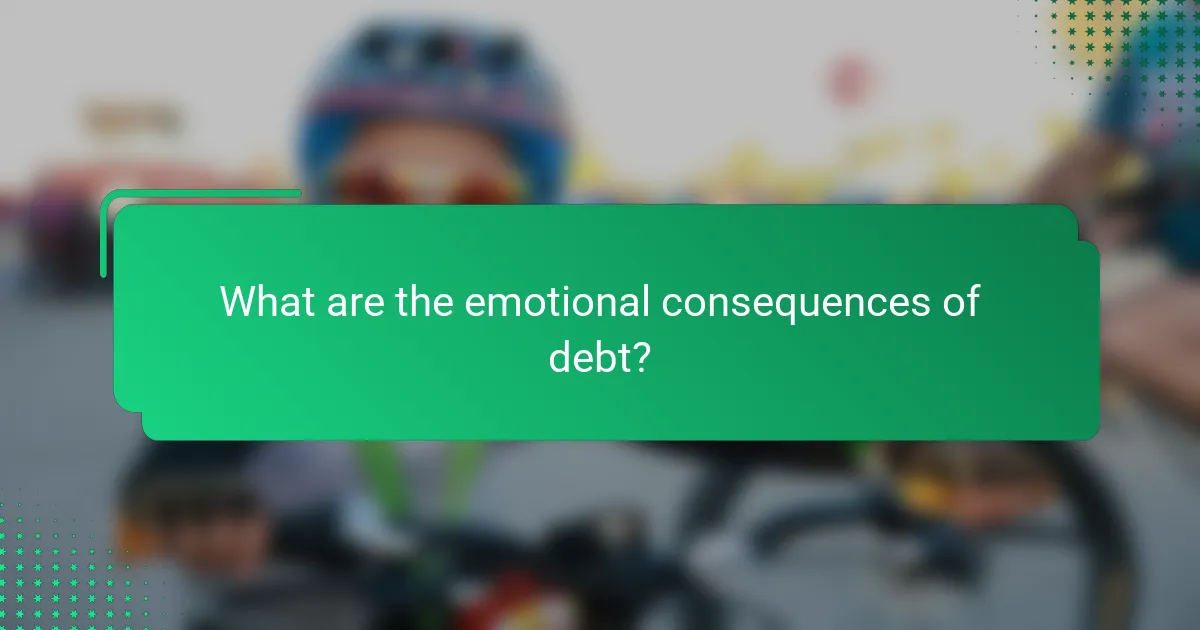
What are the emotional consequences of debt?
Debt often leads to significant emotional consequences, including anxiety and guilt. These feelings can hinder financial recovery and overall well-being. Anxiety arises from constant financial stress, leading to sleep disturbances and impaired focus. Guilt may stem from perceived failures in managing finances or burdening family members. As a result, individuals may struggle to seek help, prolonging their financial distress. Addressing these emotions is crucial for recovery, as acknowledging feelings can empower individuals to take actionable steps towards financial stability.
How does debt contribute to anxiety?
Debt significantly contributes to anxiety by creating constant stress and worry about financial stability. Individuals often experience feelings of guilt and shame, which can exacerbate mental health issues. The pressure of unpaid bills and looming debt can lead to a cycle of anxiety that affects daily life and relationships. Financial recovery requires addressing both the emotional and practical aspects of debt management.
What are the physiological responses to financial stress?
Financial stress triggers physiological responses like increased heart rate, elevated cortisol levels, and muscle tension. These responses can lead to chronic health issues if left unaddressed. Anxiety and guilt often accompany financial strain, contributing to a cycle of emotional distress. Addressing these physiological effects is crucial for effective financial recovery.
How does anxiety manifest in daily life?
Anxiety manifests in daily life through persistent worry, irritability, and physical symptoms like tension. Financial stress from debt exacerbates these feelings, leading to avoidance behaviors and strained relationships. Individuals may experience difficulty concentrating, disrupted sleep patterns, and a constant sense of dread. Recognising these manifestations is crucial for addressing emotional consequences and pursuing effective recovery strategies.
What role does guilt play in financial struggles?
Guilt significantly impacts financial struggles by exacerbating stress and hindering recovery. Individuals often feel ashamed about their debt, leading to avoidance of financial management. This emotional burden can create a cycle of anxiety, making it harder to seek help or make informed decisions. Addressing guilt is crucial for achieving financial stability and emotional well-being.
How can guilt affect personal relationships?
Guilt can severely strain personal relationships by creating barriers to open communication and trust. It often leads to feelings of shame, which can cause individuals to withdraw from loved ones. This emotional distance can foster resentment and misunderstandings, ultimately damaging the relationship’s foundation. Guilt may also prompt defensive behaviours, as individuals may feel the need to justify their actions rather than engage in honest dialogue. Addressing guilt through transparency and support is crucial for healing and restoring connection.
What are the long-term effects of guilt associated with debt?
Guilt associated with debt can lead to long-term emotional effects, including chronic anxiety and depression. These feelings can hinder financial recovery and impact overall well-being. Studies show that individuals with debt-related guilt often experience decreased self-esteem and social withdrawal, exacerbating their financial struggles. Addressing these emotional consequences is crucial for effective debt management and mental health improvement.
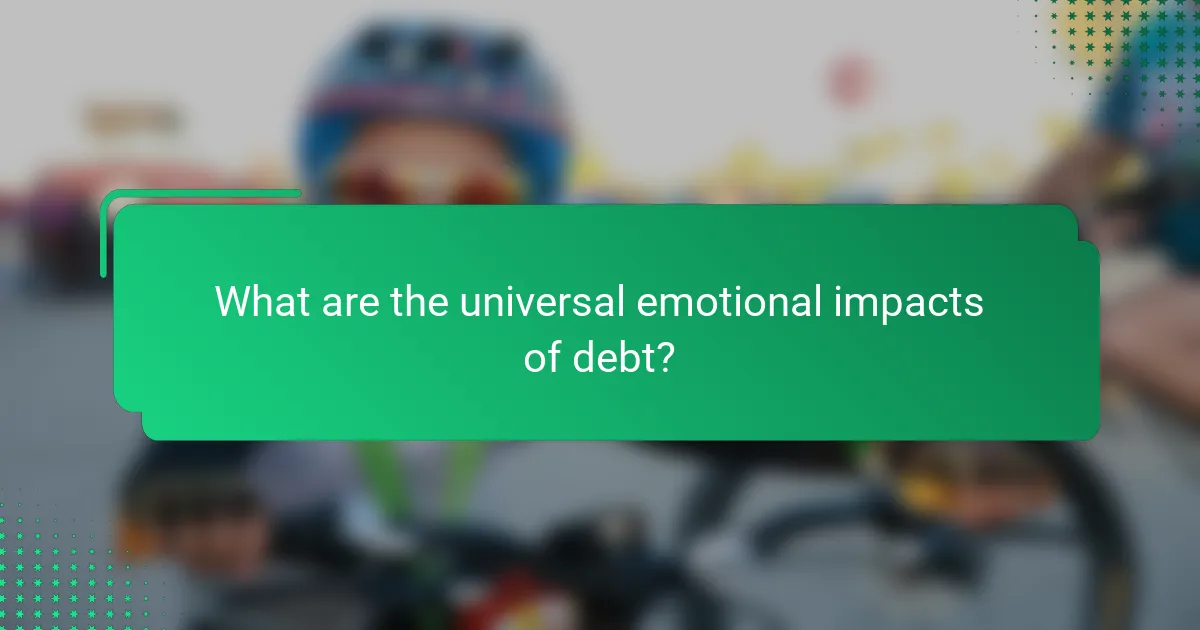
What are the universal emotional impacts of debt?
Debt universally impacts emotions, leading to anxiety, guilt, and stress. These feelings stem from financial uncertainty and societal pressures. Anxiety often manifests as constant worry about meeting obligations, while guilt arises from perceived failures in financial management. As a result, individuals may experience a decline in mental health and relationships. Addressing these emotional consequences is crucial for recovery, including seeking support and developing financial literacy.
How do common psychological patterns emerge from debt?
Debt often triggers psychological patterns such as anxiety and guilt, hindering financial recovery. These emotions stem from the stress of financial instability, leading to avoidance behaviours and a sense of helplessness. Anxiety may manifest as constant worry about repayment, while guilt can arise from perceived failures in financial management. Understanding these emotional consequences is crucial for developing effective recovery strategies, allowing individuals to address both the financial and psychological aspects of debt.
What coping mechanisms do individuals typically employ?
Individuals often employ coping mechanisms such as seeking social support, practising mindfulness, and engaging in physical activity to manage emotional consequences of debt. These strategies help alleviate anxiety and guilt, promoting a path to financial recovery. Social support can provide reassurance, while mindfulness techniques reduce stress by fostering present-moment awareness. Physical activity releases endorphins, enhancing mood and resilience against financial pressures.
How effective are these coping strategies?
Coping strategies for managing the emotional consequences of debt, such as anxiety and guilt, can be highly effective. These strategies often include mindfulness, budgeting, and seeking professional help. Research shows that mindfulness practices can reduce anxiety levels by up to 30%, while structured budgeting helps individuals regain control over their finances, alleviating feelings of guilt. Additionally, therapy can provide personalised coping mechanisms, enhancing emotional resilience. The effectiveness of these strategies varies by individual, but consistent application typically leads to significant improvements in emotional well-being and financial recovery.

What unique emotional challenges arise from specific types of debt?
Debt can lead to unique emotional challenges such as anxiety, guilt, and shame. These feelings often stem from the pressure of financial obligations and can hinder recovery efforts. For instance, individuals with credit card debt may experience heightened anxiety due to high-interest rates and monthly payments. Similarly, student loan debt can evoke guilt, particularly when borrowers feel they are not meeting societal expectations. Addressing these emotional consequences is crucial for effective financial recovery, as they can impact decision-making and overall well-being. Seeking support through counselling or financial education can help mitigate these emotional burdens.
How does student loan debt specifically affect mental health?
Student loan debt significantly impacts mental health by inducing anxiety and guilt. Individuals often experience chronic stress due to financial uncertainty, which can lead to depression. Studies show that 70% of borrowers report feeling overwhelmed by their debt, affecting daily functioning and overall well-being. Developing a financial recovery plan can mitigate these emotional consequences, fostering a sense of control and hope for the future.
What unique feelings accompany credit card debt?
Credit card debt often leads to feelings of anxiety, guilt, and stress. These emotions stem from financial pressure and the fear of long-term consequences. Anxiety manifests as worry about meeting payment deadlines and accumulating interest. Guilt arises from the perception of poor financial management, impacting self-esteem. As individuals navigate these feelings, seeking financial recovery becomes essential, promoting healthier financial habits and emotional well-being.
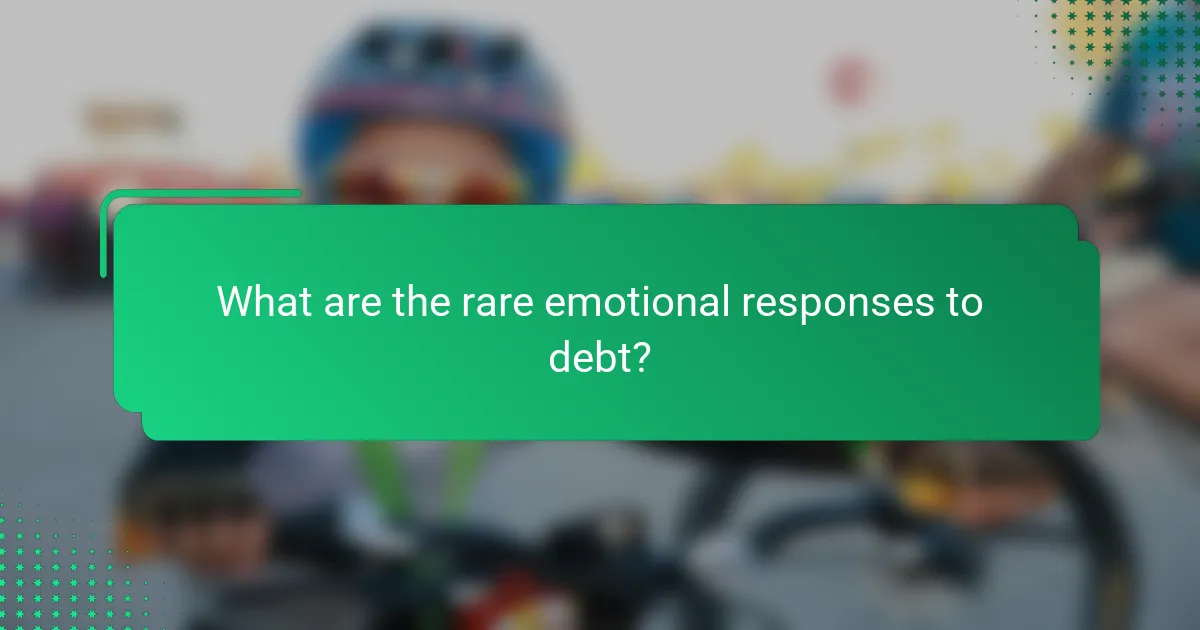
What are the rare emotional responses to debt?
Rare emotional responses to debt include feelings of isolation, shame, and hopelessness. These emotions can stem from societal stigma and personal experiences. Individuals may experience a unique sense of despair when unable to meet financial obligations. Such emotional states can hinder recovery efforts, making it essential to address them in financial counselling.
How can individuals experience relief from debt in unexpected ways?
Individuals can experience relief from debt through emotional support, financial education, and community resources. Addressing anxiety and guilt is essential for recovery. Seeking therapy or support groups can provide emotional relief. Financial literacy programmes help individuals understand budgeting and debt management. Community resources, such as nonprofit credit counselling, offer personalised guidance. Each of these approaches contributes to a holistic path toward financial recovery while alleviating emotional burdens.
What are the psychological effects of debt repayment success?
Success in debt repayment significantly reduces anxiety and guilt, fostering a sense of control and financial stability. Individuals often experience improved mental health and increased self-esteem as they overcome financial burdens. The relief from debt can lead to better relationships and enhanced overall well-being. Financial recovery paves the way for future planning and goal-setting, contributing to long-term emotional resilience.
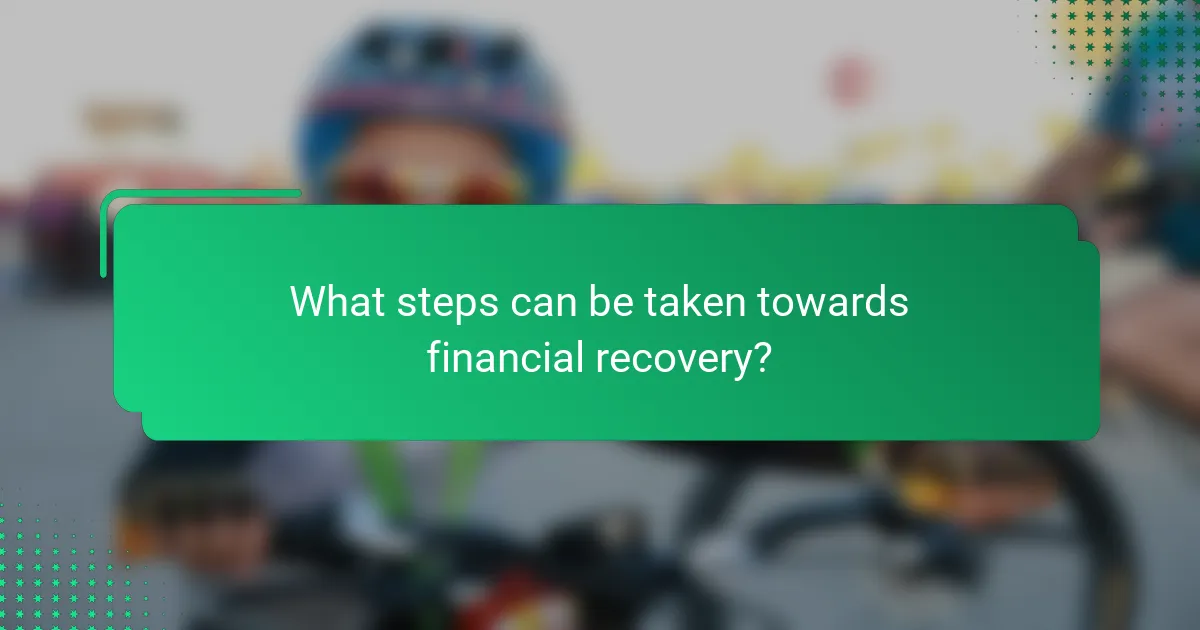
What steps can be taken towards financial recovery?
To achieve financial recovery, individuals should take proactive steps to address emotional consequences of debt. Start by acknowledging feelings of anxiety and guilt, then create a realistic budget to regain control. Next, seek professional financial advice for tailored strategies. Finally, cultivate a support network to share experiences and gain encouragement.
How can individuals effectively manage anxiety related to debt?
Individuals can manage anxiety related to debt by implementing practical strategies. First, create a realistic budget to track income and expenses. This provides clarity and control over finances. Second, seek support from friends, family, or professionals. Sharing concerns can alleviate feelings of isolation. Third, practise stress-reduction techniques such as mindfulness or exercise. These methods can help manage anxiety levels effectively. Finally, focus on small, achievable financial goals. Celebrating these milestones can boost confidence and reduce overall anxiety.
What strategies can help transform guilt into positive action?
To transform guilt into positive action, focus on actionable steps and self-compassion. Acknowledge feelings of guilt but redirect that energy into creating a financial recovery plan. Set clear, achievable goals to regain control over finances, which can alleviate anxiety. For example, budgeting or seeking financial advice can empower individuals. Engaging in positive self-talk reinforces resilience and motivates action toward recovery.
What are the best practices for maintaining mental well-being during recovery?
To maintain mental well-being during recovery from debt, practise mindfulness, set realistic goals, and seek support. These strategies help manage anxiety and guilt associated with financial challenges. Regularly engage in self-care activities to boost resilience and focus on positive financial behaviours. Additionally, consider professional counselling to address emotional consequences effectively.
What resources are available for emotional support?
Emotional support resources include counselling services, support groups, and online forums. These platforms provide safe spaces for individuals facing debt-related anxiety and guilt. Professional counselling offers tailored strategies for emotional recovery, while support groups foster community and shared experiences. Online forums allow for anonymous discussions, promoting openness and connection.
